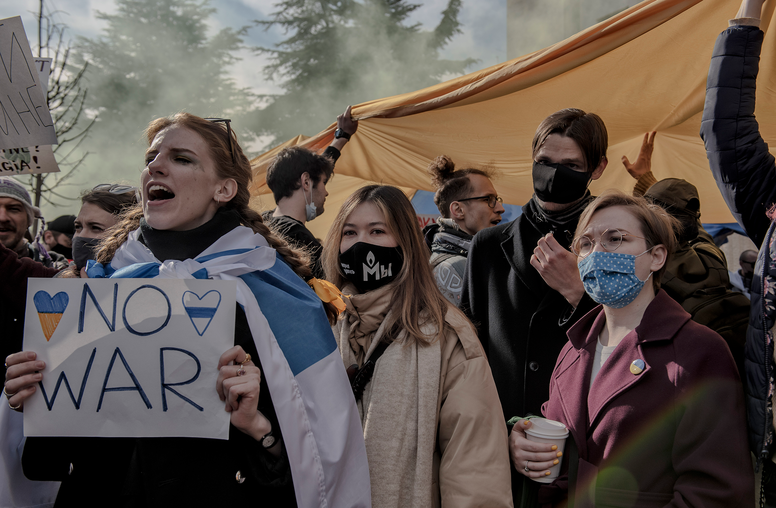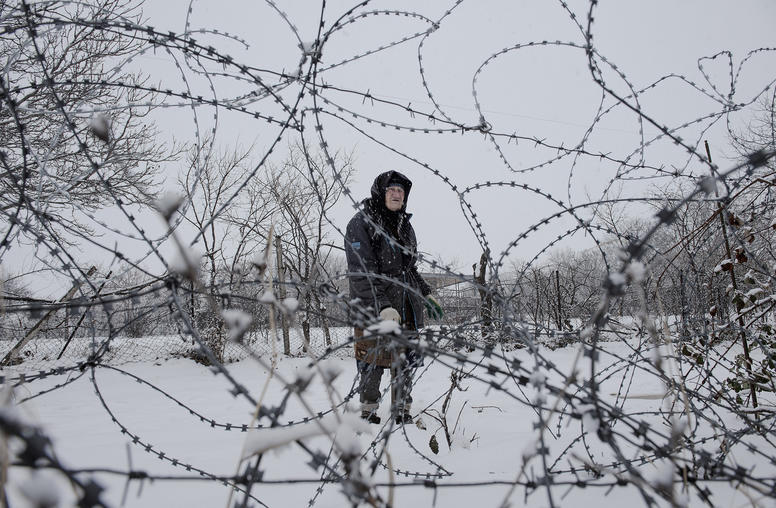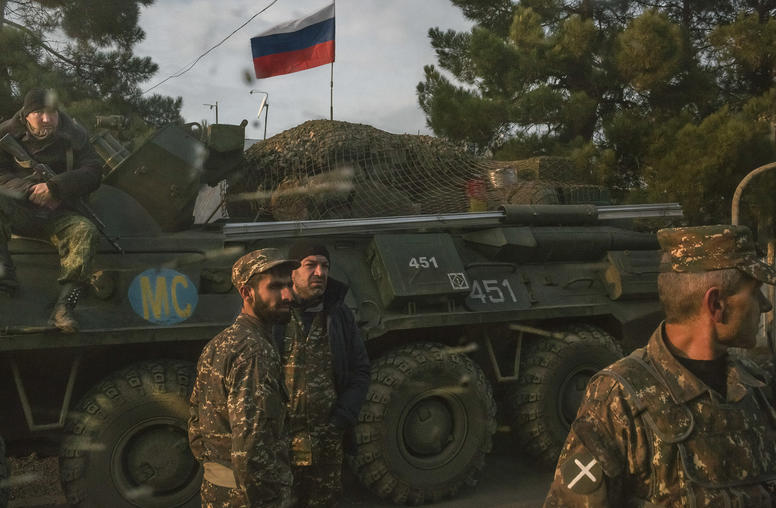Georgia's Rose Revolution: A Participant's Perspective
Why did neither protestors nor the government use force during Georgia's Rose Revolution, despite orders to do so? Author Giorgi Kandelaki provides a participant's perspective on this question and more.

Summary
- Efforts to resist calling the 2003 events in Georgia a "revolution" were misplaced. Although the turmoil was marked by a lack of violence, a critical mass of people did come out to move the country away from the rampant corruption of the Shevardnadze regimes of 1972 to 1985 (when he was Communist Party first secretary) and 1992 to 2003 (when he was president).
- As president, Shevardnadze supported independent civil society groups and media outlets such as the television station Rustavi-2. His support of these groups ended in 2001, when he tried to shut down Rustavi-2. This action prompted reform-minded members of his government to form opposition parties.
- Before the 2003 parliamentary elections, opposition groups hoped only to gain momentum for the 2005 presidential elections. However, blatant electoral fraud, Shevardnadze's refusal to compromise, and the discipline of nonviolent opposition groups precipitated his exit.
- The youth group Kmara (Enough) played an important role in combating widespread political apathy among the Georgian public and youth in particular. The successful mobilization of so many young people continues to reverberate as former Kmara members maintain their interest in politics.
- Saakashvili's National Movement party believed that its success depended on radicalizing the political sphere and thereby broadening political participation. It was particularly effective at increasing political participation among provincial populations.
- Georgia's independent media, particularly Rustavi-2, supported the Rose Revolution by providing a forum for opposition parties and nongovernmental organizations (NGOs) critical of the government. The channel also co-funded and broadcast exit polls that contradicted the official election results.
- Although a few civil society organizations did play significant roles in the revolution, most were constrained by foreign funding priorities and their own elitism. Similarly, foreign actors played a limited role because they lacked information or were overly cautious about fostering significant political change.
- There was no violence because the various security forces chose not to respond to public demonstrations with force. Three main factors drove their decision: 1) The security forces were accustomed to responding to democratic pressures and not defending autocratic rule; 2) a divided ruling party could not speak with one voice; 3) opposition groups, including Kmara, made strong efforts to build sympathy for their cause while downplaying the threat posed by political change.
- International actors can best support democratic transitions by targeting assistance to nationwide election watchdogs, such as the International Society for Fair Elections and Democracy (ISFED), that can carry out parallel vote tabulations (PVT). Ideally, large numbers of observers from similar organizations outside Georgia should be deployed, since they can be more outspoken about electoral fraud.
Introduction
When asked why the Rose Revolution took place in Georgia, many westerners point out that Georgians were fed up with their gloomy economic prospects and the government's rampant corruption. It is true that corruption, sharp economic decline, and, of course, blatant election rigging all fed the popular frustration that fueled the revolution, but these and other injustices can be found in many other countries where no democratic revolutions have occurred. Why of all countries, including the states of the former Soviet Union, did such a breakthrough happen first in Georgia? What made this country special? What factors and actors were involved? Finally, to what extent did western assistance make the revolution possible?
This report examines the specifics of the political and social landscape in Georgia before the revolution, dynamics of the protests sparked by rigged elections, and the actors who contributed to laying the groundwork for change and supporting the revolution itself. A clear picture of the Rose Revolution helps explain the most intriguing aspect of the events: that neither protesters nor the government used force despite the orders given. As an active member of Kmara, I consider all these questions and issues from a participant's perspective, providing insights not readily available from most outside observers.
Terminology: Coup, "Revolution," or Revolution?
In the immediate aftermath of the Rose Revolution, many analysts and political scientists preferred to call it a "coup." Thus they suggested that what happened on November 22-23, 2003, was no more than a group of people ousting the incumbent government. Many other authors did use the word "revolution" inside quotation marks, as if to distance themselves from such a dramatic idea. A consensus on terminology emerged only after events in Ukraine a year later, amid growing enthusiasm for the future of democracy in the former Soviet Union.
During the twentieth century, supporters of democracy came to distrust revolutions, not least because they invariably were linked to violence. Supporters of democratization preferred to describe transformation of a political regime as "transition." As a result, an entire academic discipline of "transitology" developed, inspired by democratic consolidations in Latin America and southern Europe. A new debate ensued over whether the paradigm of democratic transitions could be extended to the regime transformations taking place in Eastern Europe. In the end, the word transition prevailed, although in most Eastern European countries the changes did include the definitive defeat of one side and the involvement of the masses.
If we do not consider violence a necessary attribute of a revolution, the November 2003 events in Georgia clearly qualify as a genuine revolution, since they involved both a sudden change of power and mass mobilization. One paradoxical feature of both the Rose Revolution and the Orange Revolution in Ukraine is that they did not seek to challenge the existing political regime as defined by the national constitution. Instead, Georgian political scientist Ghia Nodia describes the Georgian revolution as a revolt in defense of the constitution.
In more general terms, the Rose Revolution was a revolt against corruption and kleptocratic government. Rampant corruption in all spheres of life had forced increasing numbers of Georgians to engage in corrupt practices. This was one of the main criticisms of Shevardnadze's opponents, and it drove people out into the square in November 2003.
Conclusion
A variety of factors made the Rose Revolution possible: the incumbent regime's systemic weakness, its history of liberal policies, the National Movement party's success in radicalizing politics and broadening political participation, civic education efforts by civil society members during recent years, free media, and the radical, nonpartisan, nonviolent Kmara.
The legacy of the Rose Revolution is great. As the first bloodless change of power in the region's history, it rekindled hopes for democracy, which many believed intrinsically foreign to this part of the world. Many observers refer to the Rose Revolution as an inspiration for what some, including Georgia's new president, Mikheil Saakashvili, have called a "new wave of democratization."
In addition to profoundly altering the development of Georgia and the Caucasus for years to come, the revolution inspired supporters of democracy throughout the former Soviet Union. Neither before nor during the 2003 mass protests in Georgia could opposition activists in Tbilisi have dreamt of the level of support the Ukrainian opposition would receive a year later from western countries and institutions.
In Georgia expectations of western support were based on western behavior following the presidential elections in Azerbaijan in October 2003. Although the Azeri presidential elections were characterized as "falling short of democratic standards," all the western diplomats in Baku except the Norwegian ambassador rushed to congratulate the incumbent president's son, Ilham Aliev, who suppressed public protests that erupted after he grabbed power. Ukraine's political weight is far greater than Georgia's, but the Georgian experience convinced many western policymakers that nonviolent regime change is indeed possible in the former Soviet Union and will not necessarily lead to civil war.
Open international support and solidarity increased the chances of success for democratic forces in Ukraine, and this could happen elsewhere in similar situations. At the same time, problems in Ukraine also confirmed the necessity to fund and train election observers capable of carrying out PVT and exit polling. Ideally, similar organizations from other former Soviet countries should assist such groups. Politically active youth groups such as Kmara must be included as well.
At the same time, in more repressive and authoritarian systems like Belarus, where it is impossible to carry out comprehensive monitoring, the danger is that the regime will control election monitoring projects and groups and approach international actors for funding.
Finally, international actors such as the European Union and the United States should abandon the illusion that rigged elections might "not be so bad" or could be "an improvement over the last elections" in most post-Soviet countries. Softening wording of election monitoring results might undermine the reputation of authoritative election monitoring organizations such as the Office of Democratic Institutions and Human Rights of the OSCE, while putting democratic activists and forces in danger. Pressures on nondemocratic regimes should include measures responding to the country 's internal situation—for example, pressure on governments to release political prisoners and stop arresting people for distributing posters. Western or EU ambassadors could make good use of their diplomatic status by publicly supporting demonstrations asserting that freedom is a right, not a luxury.
About the Report
Georgia's Rose Revolution of 2003, the first bloodless change of power in the Caucasus, occurred largely unpredicted by analysts and policymakers. Both Georgian and western observers feared and predicted yet another wave of bloodshed in this troubled former Soviet nation. Yet the enthusiasm, hard work, and nonviolent discipline of initially small groups sparked what many now call "Europe's fourth wave of liberation." "I did not think to pay serious attention to these young people running around with flags and drawing graffiti on the streets," deposed President Eduard Shevardnadze said shortly after the revolution. "I was wrong," he added.
Author Giorgi Kandelaki was elected in 2001 to Tbilisi State University's first student self-government, which pursued a high-profile campaign against corruption and for reform in higher education. In April 2003 he co-founded the youth movement, Kmara (Enough), which played an instrumental role in Georgia's November 2003 Rose Revolution. More recently he has trained young activists to organize for nonviolent change in Kazakhstan, Ukraine, Moldova, and, most recently, Belarus, where he and a colleague were detained for eleven days. Since June 2005 he has been an adviser in the administration of President Mikheil Saakashvili of Georgia.



